Endocytosis of prion protein is required for ERK1/2 signaling induced by stress-inducible protein 1
- PMID: 18579743
- PMCID: PMC2739057
- DOI: 10.1523/JNEUROSCI.1701-08.2008
Endocytosis of prion protein is required for ERK1/2 signaling induced by stress-inducible protein 1
Abstract
The secreted cochaperone STI1 triggers activation of protein kinase A (PKA) and ERK1/2 signaling by interacting with the cellular prion (PrP(C)) at the cell surface, resulting in neuroprotection and increased neuritogenesis. Here, we investigated whether STI1 triggers PrP(C) trafficking and tested whether this process controls PrP(C)-dependent signaling. We found that STI1, but not a STI1 mutant unable to bind PrP(C), induced PrP(C) endocytosis. STI1-induced signaling did not occur in cells devoid of endogenous PrP(C); however, heterologous expression of PrP(C) reconstituted both PKA and ERK1/2 activation. In contrast, a PrP(C) mutant lacking endocytic activity was unable to promote ERK1/2 activation induced by STI1, whereas it reconstituted PKA activity in the same condition, suggesting a key role of endocytosis in the former process. The activation of ERK1/2 by STI1 was transient and appeared to depend on the interaction of the two proteins at the cell surface or shortly after internalization. Moreover, inhibition of dynamin activity by expression of a dominant-negative mutant caused the accumulation and colocalization of these proteins at the plasma membrane, suggesting that both proteins use a dynamin-dependent internalization pathway. These results show that PrP(C) endocytosis is a necessary step to modulate STI1-dependent ERK1/2 signaling involved in neuritogenesis.
Figures


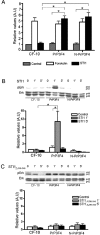
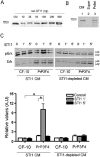

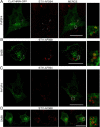
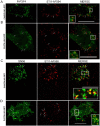
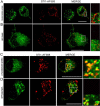
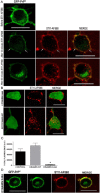
Similar articles
-
Role of alpha7 nicotinic acetylcholine receptor in calcium signaling induced by prion protein interaction with stress-inducible protein 1.J Biol Chem. 2010 Nov 19;285(47):36542-50. doi: 10.1074/jbc.M110.157263. Epub 2010 Sep 13. J Biol Chem. 2010. PMID: 20837487 Free PMC article.
-
Loss of STI1-mediated neuronal survival and differentiation in disease-associated mutations of prion protein.J Neurochem. 2018 Jun;145(5):409-416. doi: 10.1111/jnc.14305. Epub 2018 Apr 2. J Neurochem. 2018. PMID: 29337365
-
Prion protein and its ligand stress inducible protein 1 regulate astrocyte development.Glia. 2009 Oct;57(13):1439-49. doi: 10.1002/glia.20861. Glia. 2009. PMID: 19243016
-
Cellular prion protein signaling in serotonergic neuronal cells.Ann N Y Acad Sci. 2007 Jan;1096:106-19. doi: 10.1196/annals.1397.076. Ann N Y Acad Sci. 2007. PMID: 17405922 Review.
-
Understanding the neurospecificity of Prion protein signaling.Front Biosci (Landmark Ed). 2011 Jan 1;16(1):169-86. doi: 10.2741/3682. Front Biosci (Landmark Ed). 2011. PMID: 21196165 Review.
Cited by
-
Mechanisms of neuroprotection against ischemic insult by stress-inducible phosphoprotein-1/prion protein complex.J Neurochem. 2018 Apr;145(1):68-79. doi: 10.1111/jnc.14281. Epub 2018 Jan 12. J Neurochem. 2018. PMID: 29265373 Free PMC article.
-
Anionic phospholipid interactions of the prion protein N terminus are minimally perturbing and not driven solely by the octapeptide repeat domain.J Biol Chem. 2010 Oct 15;285(42):32282-92. doi: 10.1074/jbc.M110.123398. Epub 2010 Aug 2. J Biol Chem. 2010. PMID: 20679345 Free PMC article.
-
The alpha-secretase-derived N-terminal product of cellular prion, N1, displays neuroprotective function in vitro and in vivo.J Biol Chem. 2009 Dec 18;284(51):35973-86. doi: 10.1074/jbc.M109.051086. J Biol Chem. 2009. PMID: 19850936 Free PMC article.
-
Role of alpha7 nicotinic acetylcholine receptor in calcium signaling induced by prion protein interaction with stress-inducible protein 1.J Biol Chem. 2010 Nov 19;285(47):36542-50. doi: 10.1074/jbc.M110.157263. Epub 2010 Sep 13. J Biol Chem. 2010. PMID: 20837487 Free PMC article.
-
The extracellular regulated kinase-1 (ERK1) controls regulated alpha-secretase-mediated processing, promoter transactivation, and mRNA levels of the cellular prion protein.J Biol Chem. 2011 Aug 19;286(33):29192-29206. doi: 10.1074/jbc.M110.208249. Epub 2011 May 17. J Biol Chem. 2011. PMID: 21586567 Free PMC article.
References
-
- Americo TA, Chiarini LB, Linden R. Signaling induced by hop/STI-1 depends on endocytosis. Biochem Biophys Res Commun. 2007;358:620–625. - PubMed
-
- Barbosa J, Jr, Ferreira LT, Martins-Silva C, Santos MS, Torres GE, Caron MG, Gomez MV, Ferguson SS, Prado MA, Prado VF. Trafficking of the vesicular acetylcholine transporter in SN56 cells: a dynamin-sensitive step and interaction with the AP-2 adaptor complex. J Neurochem. 2002;82:1221–1228. - PubMed
Publication types
MeSH terms
Substances
Grants and funding
LinkOut - more resources
Full Text Sources
Other Literature Sources
Research Materials
Miscellaneous
